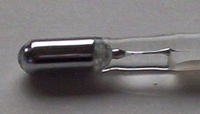
Photo from wikipedia
Contamination and bioaccumulation of toxic heavy metals in our geo-environment is a growing public health concern. Human biomonitoring is an essential step in assessing the population risk of chronic exposure… Click to show full abstract
Contamination and bioaccumulation of toxic heavy metals in our geo-environment is a growing public health concern. Human biomonitoring is an essential step in assessing the population risk of chronic exposure to environmental contaminants. Whole kidneys collected from a cohort of 92 deceased individuals undergoing forensic autopsies in Colombo, Sri Lanka, were analysed for cadmium (Cd) bioaccumulation using ICP-MS. Mean age of the population was 55.4 ± 15.4 years. Mean and median renal Cd concentrations of the total population were 4.38 and 2.60 μg g-1 w/w, respectively, which were below estimated toxic ranges. Males accumulated higher levels of Cd than females (p = 0.377). Cd concentrations were higher in the < 60 age group than the > 60 age group (p = 0.92), while the highest levels were reported in 51-60 age group. However, no significant correlation was found between renal Cd concentration and age (Ʈb = - 0.005, p = 0.94). Individuals who smoked, chewed betel or consumed alcohol were found to have elevated renal Cd concentrations in comparison to those who did not use these substances. This is the largest autopsy study on renal Cd bioaccumulation in Sri Lanka, and the findings do not indicate a high exposure risk to environmental Cd contamination at present.
Journal Title: Biological trace element research
Year Published: 2021
Link to full text (if available)
Share on Social Media: Sign Up to like & get
recommendations!